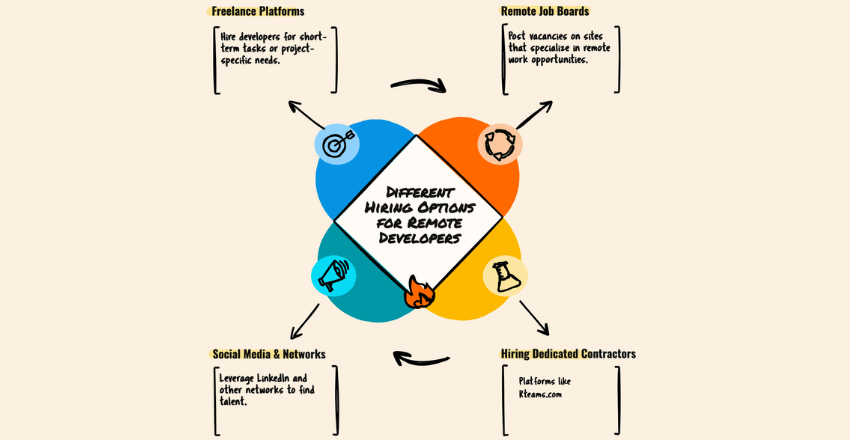Menu
Hiring remote software developers has become increasingly popular as companies recognize the benefits of remote work. To hire remote developers, employers should consider their specific needs and goals, as well as the different hiring options available.
Table of Contents
ToggleHiring remote software developers offers several advantages, making it a worthwhile strategy for companies seeking long-term success. Remote work has become increasingly popular, and for good reason. It allows businesses to tap into a global talent pool, access specialized skill sets, and reduce operational expenses. By embracing remote development, companies can stay competitive in the digital age.
When it comes to recruiting remote software developers, there are various strategies that businesses can employ. One common approach is to ask for referrals from trusted sources in the tech industry. This can help identify talented developers who have a proven track record. Attending tech conferences and networking events is another effective way to connect with potential remote developers and build relationships with industry professionals.
For companies looking for more flexibility in their hiring process, freelance platforms like Upwork and TopTal provide access to a wide range of skilled software developers. These platforms allow businesses to connect with developers on a project-by-project basis or for long-term contracts. Additionally, hiring dedicated full-time contractors through platforms like YouTeam can ensure consistent support and collaboration with remote developers.
| Benefits of Hiring Remote Software Developers |
|---|
| Access to a global talent pool |
| Reduced operational expenses |
| Increased flexibility |
| Improved productivity |
By embracing remote development, companies can tap into a global talent pool, reduce operational expenses, increase flexibility, and improve productivity.
When hiring remote software developers, it’s crucial to establish a consistent remote interview process. This involves setting clear goals and priorities, conducting thorough screenings through video calls, and evaluating essential skills and traits. Strong communication skills, self-discipline, and the ability to prioritize tasks are among the key qualities businesses should look for in remote candidates.
To facilitate collaboration with remote teams, communication tools like Skype and Slack are essential. These platforms provide real-time communication and file-sharing capabilities, making it easier for remote developers to stay connected and work together effectively. By leveraging these tools, businesses can overcome the challenges of remote team collaboration and create a productive work environment.
Hiring remote software developers offers numerous benefits for companies looking to achieve long-term success. By accessing a global talent pool, reducing operational expenses, and increasing flexibility, businesses can stay ahead in the ever-evolving tech industry.
However, it’s important to establish a consistent remote interview process, evaluate essential skills and traits, and leverage communication tools for effective collaboration. By doing so, companies can embrace the advantages of remote development and thrive in the digital landscape.

Hiring remote developers offers numerous benefits to employers, allowing them to optimize their operations and tap into a diverse talent pool. This approach can significantly reduce operational expenses, as remote developers often work on a contract or freelance basis, eliminating the need for full-time salaries and benefits. By accessing a global talent pool, employers can find skilled developers with specialized expertise and experience, maximizing the potential for successful project outcomes.
Flexibility is another advantage of hiring remote developers. Employers can scale their development teams up or down quickly and easily, depending on project requirements and business needs. This flexibility allows companies to adapt to changing market conditions and seize new opportunities without the constraints of traditional employment arrangements.
When it comes to productivity, remote developers often excel due to the increased focus and autonomy that remote work provides. Working from their preferred environment, remote developers can eliminate office distractions and create a personalized setup that fosters efficiency and creativity. As a result, employers can expect higher productivity levels and faster project delivery.
| Benefits of Hiring Remote Developers |
|---|
| Reduced operational expenses |
| Access to a global talent pool |
| Increased flexibility |
| Enhanced productivity |
Hiring remote developers can significantly benefit employers by optimizing operations, embracing global talent, and achieving greater flexibility and productivity. By carefully selecting and managing remote teams, businesses can unlock the full potential of remote work and drive long-term success.

When hiring remote developers, employers have access to different hiring options that make the process more flexible and efficient. These options can be tailored to meet the specific needs and goals of the business. Here are some of the most common hiring options for remote developers:
Employers should carefully consider their specific requirements and preferences when choosing a hiring option for remote developers. Each option has its own advantages and may be more suitable depending on the nature of the project, budget, and desired level of involvement.
By exploring these different hiring options, employers can find the right remote developers who align with their goals, whether it’s for short-term projects, long-term collaborations, or outsourcing entire development processes.
| Hiring Option | Advantages | Considerations |
|---|---|---|
| Asking for Referrals | Access to trusted recommendations, pre-vetted candidates | Limited pool of candidates, may not align with specific requirements |
| Attending Tech Conferences | Opportunity to network with talented developers | Time and cost of attending conferences, limited selection |
| Using Freelance Platforms | Wide range of skills and experience, flexibility | Varying quality of freelancers, may require time for screening and evaluation |
| Hiring Dedicated Contractors | Commitment and focus of dedicated team members | Higher cost compared to short-term freelancers, limited control over team composition |
| Outsourcing to Software Development Companies | Specialized expertise, project management and scalability | Loss of direct control, longer communication channels |
Employers should carefully evaluate and compare these hiring options to determine which one aligns best with their specific needs and goals. By choosing the right hiring option, businesses can ensure a successful and smooth remote developer recruitment process.
To ensure successful remote tech recruitment and find long-term remote developers, it is crucial to establish a consistent interview process. This process helps in evaluating candidates effectively and making informed hiring decisions. Here are some key steps to consider:
Before starting the interview process, it’s essential to define the specific goals and priorities for hiring remote developers. This includes determining the technical skills, experience level, and cultural fit required for the role. By establishing clear criteria, you can ensure that you are targeting the right candidates.
Video calls are a valuable tool for conducting first screenings of remote developers. This allows you to assess their communication skills, professionalism, and overall fit for the role. It’s important to prepare a set of relevant questions to ask during the video call and evaluate the candidate’s responses.
During the interview process, it’s crucial to assess the essential skills and traits required for remote developers. This may include evaluating their ability to prioritize tasks, their communication skills, and their self-discipline. Look for candidates who have experience working remotely and have demonstrated success in managing their time and tasks effectively.
By utilizing these steps and establishing a consistent remote interview process, you can ensure that you are hiring the right remote developers for your team. Remember to use the appropriate communication tools like Skype and Slack to facilitate remote team collaboration and address any challenges that may arise along the way. Hiring remote developers can offer numerous benefits for both employers and employees, leading to long-term success in your software development endeavors.

When evaluating remote developers, it is important to assess key skills and traits that contribute to their success in a remote work environment. Prioritizing, communication skills, and self-discipline are among the essential qualities that employers should consider. Effective prioritization allows remote developers to manage their workload efficiently and meet deadlines consistently. Their ability to communicate effectively is crucial for successful collaboration with remote team members, ensuring that information is conveyed clearly and promptly. Self-discipline is also highly valued, as it demonstrates the ability to work independently and stay focused, even without direct supervision.
Creating a table to evaluate candidates based on these key skills and traits can provide a structured and objective approach to the hiring process. This table can include specific criteria under each skill or trait, such as the candidate’s ability to prioritize tasks, their proficiency in written and verbal communication, and their demonstrated self-discipline in previous remote work experiences. Assigning numerical ratings or using a scoring system can help employers compare and rank candidates objectively.
| Skills and Traits | Evaluation Criteria |
|---|---|
| Prioritizing | Ability to manage workload effectively and meet deadlines consistently. |
| Communication Skills | Proficiency in written and verbal communication for effective collaboration. |
| Self-Discipline | Demonstrated ability to work independently and stay focused without direct supervision. |
In addition to assessing these key skills and traits, it is important to consider the candidate’s experience working remotely and their adaptability to remote work environments. Remote developers who have previous experience successfully working in distributed teams are more likely to seamlessly integrate into your remote team and understand the unique challenges and dynamics associated with remote work.
When evaluating candidates, it can be valuable to seek references from previous employers or team members who have worked with the candidate remotely. These references can provide insights into the candidate’s remote work capabilities and further validate their skills and traits.
By thoroughly evaluating the key skills and traits that contribute to success in a remote work environment, employers can make informed decisions when hiring remote developers. This ensures that the selected candidates possess the necessary qualities to thrive in a remote setting, promoting long-term success for both the employer and the remote team.

Effective communication tools play a vital role in facilitating remote team collaboration and ensuring seamless communication among team members. In a remote work setup, it is crucial to have reliable and efficient tools that enable real-time communication, file sharing, and project management. Two popular communication tools that are widely used in remote teams are Skype and Slack.
Skype is a versatile communication tool that allows teams to connect through video calls, voice calls, and instant messaging. It offers features such as screen sharing, file sharing, and group chat, making it easy for team members to collaborate and stay connected. With Skype, remote developers can have face-to-face meetings, share progress updates, and discuss project details in real time.
Slack, on the other hand, is a team communication platform that brings all communication channels into one place. It provides channels for different projects, teams, or topics, allowing team members to have focused discussions. Slack offers features like instant messaging, file sharing, and integrations with other productivity tools, making it a powerful tool for remote team collaboration. It also has a searchable message history, so team members can easily find important information and avoid miscommunication.
| Skype | Slack |
|---|---|
| Video calls | Instant messaging |
| Voice calls | Channel-based communication |
| Screen sharing | File sharing |
| Group chat | Integrations with other tools |
By leveraging these communication tools, remote developers can collaborate effectively, share information effortlessly, and stay connected with their team members. Whether it’s through video calls on Skype or channel-based discussions on Slack, these tools help bridge the physical distance and foster a sense of teamwork and collaboration among remote team members.
Effective utilization of communication tools like Skype and Slack is essential for remote team collaboration. By choosing the right tools and maximizing their features, employers can create a productive and cohesive remote team that works together seamlessly, regardless of their physical locations.
While hiring remote developers offers numerous benefits, there are also challenges that employers need to address to ensure successful remote collaboration. These challenges include:

By implementing effective strategies and utilizing project management tools, employers can address the challenges associated with hiring remote developers. One of the main concerns when working with remote developers is ensuring quality of service. To mitigate this challenge, employers can create a rigorous screening process that includes technical assessments and portfolio reviews. This helps to identify talented developers who can consistently deliver high-quality work.
Another challenge is avoiding cost overruns. To manage this, employers can establish clear project scopes and milestones, as well as implement regular progress tracking. By setting realistic budgets and tracking expenses against these budgets, employers can ensure that projects stay within the allocated resources.
Time zone differences can also pose a challenge in managing remote teams. However, employers can address this by creating clear communication guidelines and establishing regular meeting times that accommodate different time zones. Additionally, leveraging project management tools with built-in time zone features can help facilitate efficient collaboration across international teams.
| Challenges of Hiring Remote Developers | Strategies to Address Challenges |
|---|---|
| Ensuring quality of service | Create a rigorous screening process Conduct technical assessments and portfolio reviews Identify talented developers |
| Avoiding cost overruns | Establish clear project scopes and milestones Implement regular progress tracking Set realistic budgets and track expenses |
| Managing time zone differences | Create clear communication guidelines Establish regular meeting times that accommodate different time zones Utilize project management tools with built-in time zone features |
Lastly, tracking and managing team productivity can be a concern when working with remote developers. To address this, employers can utilize project management tools that offer features such as task management, time tracking, and progress reporting. These tools provide transparency and accountability, allowing employers to effectively monitor the progress and productivity of remote teams.
By implementing these strategies and leveraging project management tools, employers can overcome the challenges associated with hiring remote developers. With clear communication, efficient collaboration, and effective task management, employers can ensure successful outcomes and foster long-term success in remote software development.
Informed decision-making is crucial to ensure long-term success when hiring remote developers and effectively managing remote teams. Hiring remote developers requires careful consideration of specific needs and goals, as well as exploring different hiring options. Companies can ask for referrals, attend tech conferences, utilize freelance platforms like Upwork and TopTal, hire dedicated full-time contractors through platforms like YouTeam, or outsource the development process to specialized software development companies.
To establish a consistent remote interview process, companies should set clear goals and priorities. This process typically involves conducting first screenings through video calls, evaluating essential skills and traits like prioritizing, communication skills, and self-discipline, and ensuring a good cultural fit. Communication tools such as Skype and Slack can greatly facilitate remote team collaboration, enabling seamless communication and efficient collaboration.
There are several challenges associated with hiring remote developers, including ensuring quality of service, avoiding cost overruns, managing mismatched expectations, dealing with time zone differences, and effectively tracking and managing team productivity. However, by carefully evaluating candidates, clearly communicating needs and expectations, and utilizing project management and communication tools, these challenges can be addressed and overcome.
Hiring remote developers offers numerous benefits for both employers and employees. Employers can reduce operational expenses, gain access to a global talent pool, increase flexibility, and improve overall productivity. Remote developers can enjoy better work-life balance, increased time efficiency, and enhanced productivity. By making informed decisions throughout the hiring process and effectively managing the remote team, companies can achieve long-term success in their software development endeavors.
Embracing remote software development can lead to long-term success by leveraging the benefits of remote work. Companies worldwide are recognizing the advantages of hiring remote developers, and one such company is “Rteams” based in Brazil. With their dedicated developers and teams, “Rteams” offers exceptional support for businesses looking to embrace remote software development.
To achieve success in hiring remote developers, it is crucial to consider specific needs and goals. Employers have various hiring options at their disposal, including asking for referrals, attending tech conferences, using freelance platforms like Upwork and TopTal, hiring dedicated full-time contractors through platforms like YouTeam, or outsourcing the development process to specialized software development companies.
https://jaydevs.com/how-to-hire-remote-developers/
https://youteam.io/blog/guide-to-hiring-remote-team-of-software-developers/
https://blog.hubspot.com/website/how-to-hire-remote-developers
About the author: Jacob Tenwick
Avid business developer and development manager
Input your search keywords and press Enter.